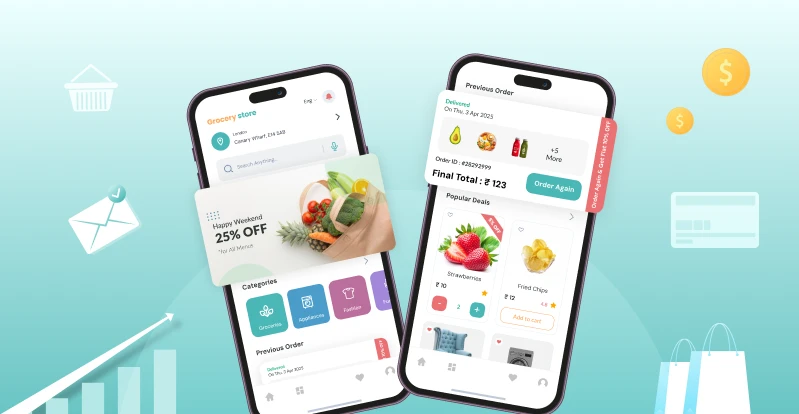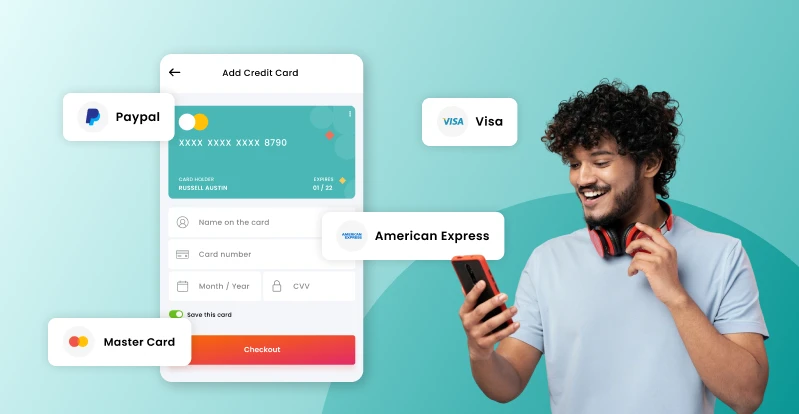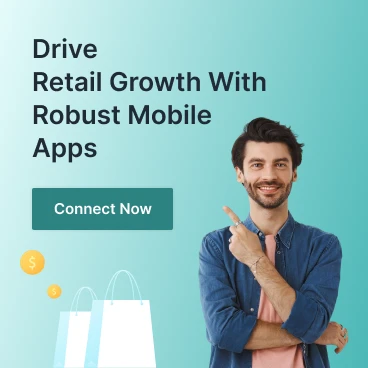How Mobile Apps Are Transforming the eCommerce Experience in the UK

The UK eCommerce landscape is undergoing a significant transformation, driven by the rapid adoption of mobile commerce. With more consumers preferring mobile-first shopping experiences, businesses must adapt to meet evolving expectations. Statista revealed, “70% of UK online shoppers routinely use retail apps, increasing reliance on mobile technology”. Mobile apps have become a crucial tool in enhancing convenience, engagement, and conversion rates.
From personalised shopping experiences to seamless payment solutions, mobile apps are reshaping how UK businesses interact with their customers. However, challenges such as intense competition, high customer expectations, and the need for seamless digital experiences make it essential for retailers to implement innovative solutions.
This blog explores key areas where mobile apps are revolutionising UK eCommerce and helping businesses stay ahead.
The Rise of Mobile Commerce in the UK
Mobile commerce (mCommerce) in the UK has seen unprecedented growth, reshaping consumer shopping behavior. Smartphones have become the preferred device for shopping, overtaking desktops, with mCommerce accounting for over half of all eCommerce sales.
This shift is driven by increased smartphone usage and improved network infrastructure, including 5G. As mobile penetration rises and network speeds improve, mCommerce’s dominance is set to expand further, indicating its critical role in the digital economy.
The changing shopping habits of UK consumers highlight their preference for mobile-first experiences. Shoppers favor mobile apps over websites due to enhanced user experiences, such as faster browsing, exclusive discounts, and loyalty rewards.
The convenience of on-the-go transactions and tailored shopping features has strengthened the bond between consumers and retailers. This trend is especially apparent as businesses invest in intuitive apps to meet these demands.
The introduction of 5G networks has accelerated mCommerce growth by enabling faster load times, smoother transactions, and cutting-edge shopping experiences like augmented reality (AR) and virtual reality (VR). This technological advance is reshaping how consumers interact with retailers, offering immersive and efficient shopping journeys.
Successful case studies from brands like ASOS and Tesco demonstrate the potential of leveraging mobile apps effectively. ASOS’s app excels with personalized recommendations and easy checkout, while Tesco integrates online and offline shopping through features like barcode scanning and delivery tracking.
Despite its rapid rise, mCommerce faces challenges. Many UK retailers struggle with optimizing mobile apps, leading to slow load times, poor user experiences, and abandoned carts. Retailers must address these issues to maximize revenue opportunities and fully harness mCommerce’s potential.
The combination of changing consumer habits, 5G-driven innovations, and effective app strategies underscores mCommerce as a pivotal force shaping the future of retail in the UK. However, addressing optimization challenges remains crucial for sustained growth.
Major Challenges Faced By UK Market Without Mobile Apps
Limited Customer Engagement
Without a mobile app, businesses lose out on direct and real-time communication with customers. Mobile apps enable push notifications, personalized offers, and targeted promotions, which keep users engaged and encourage repeat purchases. The lack of an app means e-commerce businesses miss a critical channel to build customer loyalty and increase engagement.
Reduced Convenience and Accessibility
Mobile apps offer a seamless shopping experience, allowing customers to browse, make purchases, and track orders anytime and anywhere. Without a dedicated mobile app, users must rely on web-based platforms that may not be mobile-optimized, leading to slower load times, difficult navigation, and a poor user experience. This limits accessibility and may drive customers to competitors with more convenient platforms.
Missed Personalization Opportunities
Apps can collect valuable customer data, including browsing habits and purchase history, to deliver tailored recommendations and personalized shopping experiences. Without an app, retailers miss out on these opportunities, making it harder to engage customers with relevant products and promotions. This impacts customer satisfaction and reduces the potential for upselling or cross-selling.
Decreased Customer Retention
The lack of a mobile app means businesses cannot offer loyalty features or reward programs, which are vital for retaining customers. Mobile apps make it easy to track purchase history and offer loyalty-based incentives, encouraging repeat business. Without an app, it’s harder to maintain long-term customer relationships, which may affect retention rates.
Poor Mobile User Experience
Websites that aren’t mobile-friendly often result in a frustrating shopping experience. Apps are specifically designed to offer a smooth, intuitive interface optimised for mobile devices. Without an app, customers may face challenges with navigation, product browsing, and checkout, leading to a higher likelihood of cart abandonment.
Limited Data Insights
Mobile apps enable businesses to track detailed customer behavior, helping retailers understand shopping patterns and preferences. Without this data, businesses lack actionable insights to inform targeted marketing campaigns and product offerings, reducing their ability to create personalised experiences that drive sales.
Security Concerns
Mobile apps often provide enhanced security features, such as biometric authentication and secure payment gateways. These measures build trust with customers, especially when it comes to sensitive payment information. Without a dedicated app, e-commerce businesses are more reliant on web-based transactions, which may feel less secure to customers, leading to concerns about privacy and data protection.
How Mobile Apps are changing eCommerce experience for the UK customers
Enhanced Personalisation
Mobile apps are revolutionising the way UK retailers personalise the shopping experience. By using AI and machine learning, apps track users’ browsing and purchase behaviors to recommend products tailored to individual preferences. This level of personalisation not only increases customer satisfaction but also boosts sales and repeat business.
Features like personalised promotions, loyalty rewards, and custom offers ensure that every user has a unique shopping journey, leading to stronger engagement and higher conversion rates. Retailers like Boots and Argos have effectively harnessed these tools, providing customers with relevant shopping experiences.
AI-Powered Product Recommendations
AI-driven product recommendations are reshaping how UK customers discover products. Mobile apps collect data from previous purchases and browsing habits to provide highly relevant suggestions, making shopping faster and more convenient. This technology has made it easier for consumers to find exactly what they want without extensive searching.
Retailers can also bundle products based on past preferences, providing a more personalized shopping experience. Not only does this improve customer satisfaction, but it also encourages upselling and cross-selling, boosting the retailer’s bottom line.
Faster and Secure Checkout
A seamless checkout experience is vital for reducing shopping Cart Abandonment and increasing conversions. Mobile apps allow for faster checkout processes with options like saved payment methods, one-click buying, and integration with popular payment platforms such as Apple Pay, Google Pay, and BNPL services.
Additionally, biometric authentication, like facial and fingerprint recognition, enhances security, making mobile transactions safer and more convenient. These features reduce friction, improve customer trust, and ensure quicker purchase completions, ultimately driving sales growth for retailers in the UK.

Omnichannel Shopping Experience
Mobile apps have bridged the gap between online and in-store shopping, providing UK customers with a seamless omnichannel experience. Features like Click & Collect allow customers to order online and pick up in-store, enhancing convenience. Real-time inventory tracking ensures that customers are aware of product availability across various locations.
QR code scanning enables customers to instantly access detailed product information in-store, creating an integrated shopping experience. Retailers like John Lewis have embraced this strategy, allowing consumers to move effortlessly between digital and physical stores.
AI-Driven Customer Support
AI-powered chatbots are revolutionizing customer support in the UK, providing 24/7 assistance and personalized interactions. These chatbots leverage machine learning and natural language processing to understand customer queries, offer product recommendations, and resolve issues efficiently.
They also utilize predictive analytics to anticipate customer needs, ensuring that support is proactive and timely. This technology reduces wait times, increases satisfaction, and streamlines business operations. Retailers adopting AI-driven solutions can enhance customer loyalty and reduce operational costs, creating a more efficient and responsive service experience.
Augmented Reality (AR) Shopping
AR is transforming the way UK customers engage with products by allowing them to visualize items before making a purchase. Mobile apps with AR technology enable users to virtually try on clothing, test makeup, or view how furniture would look in their home environment.
This immersive experience increases customer confidence in their purchase decisions, reducing return rates and enhancing satisfaction. Leading retailers are using AR to create engaging and interactive shopping experiences that set them apart in a competitive market, providing customers with a fun and futuristic way to shop.
Gamification and Loyalty Programs
Mobile apps have made loyalty programs more interactive and engaging through gamification. Retailers in the UK are using features like spin-the-wheel discounts, referral bonuses, and tier-based rewards to keep customers engaged. Gamified elements encourage users to return to apps regularly, participate in challenges, and earn rewards for their purchases, fostering brand loyalty.
This approach not only enhances user engagement but also increases customer lifetime value, ensuring sustained sales growth for retailers. These innovative programs make the shopping experience more enjoyable and rewarding for customers.
Voice Commerce and Smart Assistants
Voice commerce is gaining momentum in the UK, with mobile apps integrating voice-activated shopping features. Through voice assistants like Amazon Alexa and Google Assistant, customers can search for products, add them to their cart, and even make purchases hands-free.
This technology is especially beneficial for busy consumers looking for a more convenient and accessible shopping experience. As voice commerce evolves, UK retailers are optimizing their apps for voice search, providing customers with a faster and more intuitive way to shop, increasing accessibility and enhancing user satisfaction.
Sustainability and Ethical Shopping
UK consumers are increasingly concerned with sustainability, and mobile apps are playing a crucial role in supporting ethical shopping habits. Retailers are using apps to promote eco-friendly products, provide carbon footprint information, and offer digital receipts to reduce paper waste.
Additionally, AI is used to recommend sustainable shopping choices, guiding consumers toward more environmentally conscious options. This focus on sustainability not only meets consumer demand but also enhances brand reputation, fostering trust and loyalty. Retailers who adopt sustainable practices are likely to attract a growing base of eco-conscious consumers.
Real-Time Customer Feedback and Reviews
Mobile apps have transformed how UK customers interact with reviews and feedback systems. By allowing users to easily rate products and leave comments, apps provide valuable insights into customer satisfaction.
Retailers can use this real-time feedback to improve products, enhance customer service, and refine their overall shopping experience. Instant reviews also help potential buyers make quicker decisions, improving conversion rates.
The transparency provided by these systems builds trust between retailers and customers, ensuring a more transparent and reliable shopping environment, which is crucial in today’s competitive eCommerce landscape.
Success Stories
ASOS
ASOS, a leading retail brand in the UK has leveraged its mobile app to provide a seamless and personalized shopping experience. Which has helped them to dominate the UK fashion eCommerce market.
The app offers AI-powered recommendations, AR-based virtual try-ons, and a streamlined checkout process with multiple payment options, including Klarna and Apple Pay. ASOS also uses push notifications for exclusive discounts and personalized promotions.
Its integration with social media platforms enhances customer engagement. These features have helped ASOS increase mobile sales, improve customer retention, and stay competitive in the fast-fashion industry.
Marks & Spencer
Marks & Spencer is a well-known brand based in London, offering exclusive fashion clothes and beauty products to transform their business sale with the help of mCommerce. They choose mobile app that enhances convenience by offering features like Click & Collect, real-time stock availability, and loyalty integration with its Sparks rewards program.
Customers can also benefit from AI-driven personalized recommendations and an easy-to-navigate interface. The app also supports secure mobile payments and digital receipts, promoting sustainability.
M&S leverages push notifications to inform customers about promotions and restocks. These digital innovations have helped M&S increase engagement, drive footfall to physical stores, and strengthen its omnichannel presence in the UK market.
JD Sports
JD Sports is a multinational sports fashion retail brand based in Bury that has successfully used its mobile app to engage UK customers through exclusive product launches. They implemented personalised offers and seamless omnichannel shopping for offering the best shopping experience.
The app features AI-driven recommendations, real-time inventory tracking, and an integrated loyalty program. JD Sports also incorporates gamification elements, such as app-only competitions and rewards, to boost engagement.
Further, they also did a social media integration that allows their users to shop directly from influencer collaborations. By prioritizing mobile commerce, JD Sports has significantly boosted online sales, customer retention, and brand loyalty among younger UK consumers.
How to Launch a Mobile App for Your Brand
Launching a mobile app for your brand requires careful planning, development, and marketing to ensure success. Here’s a step-by-step guide:
Define Objectives & Target Audience
Identify the purpose of your app and the problems it will solve. Research your target audience, their preferences, and their expectations to create a user-friendly experience.
Plan Features & Functionality
Outline key features such as seamless navigation, AI-powered recommendations, secure payment options, and push notifications. Prioritize essential functionalities to provide value to users and enhance engagement.
Choose the Right Development Approach
Decide whether to build a native, hybrid, or web-based app. Native apps (iOS/Android) offer better performance, while hybrid apps provide cost-effective cross-platform compatibility.
Develop & Test the App
Work with experienced developers to create a visually appealing and high-performing app. Conduct rigorous testing to eliminate bugs and ensure smooth performance across different devices.
Optimize for App Store & SEO
Ensure your app is optimized for the App Store and Google Play with an engaging description, relevant keywords, and high-quality visuals to improve visibility and downloads.
Implement a Marketing Strategy
Promote the app through social media, influencer collaborations, and email campaigns. Leverage paid ads and offer launch discounts to attract users.
Collect Feedback & Improve
Encourage users to leave reviews and continuously update the app based on customer feedback to enhance performance and user experience.
A well-executed mobile app launch can boost brand engagement, increase sales, and improve customer retention.
Future Trends in Mobile E-commerce
Impact of 5G Technology
5G networks will revolutionize mobile e-commerce with faster internet speeds and lower latency. Features like instant page loading, high-quality video streaming, and real-time product demonstrations will make shopping smoother and more efficient for mobile app users. This technology will particularly enhance experiences requiring high-speed connectivity, ensuring a seamless mobile shopping process.
AI-Powered Predictive Shopping
Advanced data analytics and machine learning will allow mobile apps to predict customer preferences based on browsing history, past purchases, and real-time behavior. This will result in highly personalized recommendations, improving customer satisfaction, encouraging loyalty, and boosting repeat purchases.
Social Commerce Integrations
Platforms like Instagram, Facebook are integrating e-commerce functionalities, allowing customers to shop directly within these apps. This trend simplifies the shopping journey by seamlessly transitioning users from product discovery to purchase, creating a more convenient and engaging experience.

Augmented Reality (AR)
AR technology will elevate mobile shopping by enabling virtual try-ons for clothing, makeup, and home décor. This feature offers an interactive experience, helping customers make well-informed decisions and reducing the likelihood of product returns.
Blockchain-Based Transactions
Blockchain technology will enhance security in mobile transactions, offering transparency and safeguarding personal data. Decentralized systems will ensure secure payments while fostering trust among consumers.
Future-Proof Business Strategies
The combination of these technologies will create a more immersive, secure, and efficient shopping environment. With faster connections, smarter algorithms, and enhanced shopping tools, businesses will be able to provide a future-proof strategy that aligns with consumer demands for convenience, security, and personalization. These advancements will drive business growth and keep UK retailers competitive in the evolving e-commerce landscape.
These emerging trends highlight how technology is shaping the future of mobile e-commerce, promising to create enhanced user experiences while driving significant growth opportunities for UK retailers.
Conclusion
Mobile apps are fundamentally reshaping the UK eCommerce industry by providing seamless, personalized, and secure shopping experiences. Investing in mobile-first strategies is essential for businesses looking to stay competitive and drive long-term growth. The young generation is completely dependent on mobile apps; therefore, it’s important to focus on mCommerce.
For businesses that have yet to implement a mobile-first approach, now is the time to act. By integrating innovative mobile solutions, retailers can create a frictionless shopping experience, improve brand loyalty, and thrive in the evolving digital landscape.
To take the complete benefit of the Mobile app, it’s important to connect with a reliable mobile app development company in the UK. Connect with the right expert and ensure a fruitful outcome for your eCommerce business.













